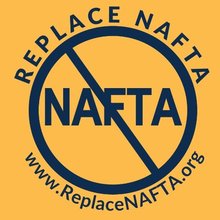
The Portland Alliance statement reads:
As the US begins to re-negotiate NAFTA, the Alliance for Democracy in Portland, Oregon requests that negotiations be public, and transparent, and benefit all people in the United States, Mexico, and Canada. The negotiations must be open, public and transparent. Any negotiations which is done by the 500 corporate trade advisers only will be rejected by the people. Representative of the people must be present, participating fully and have a meaningful part of all negotiations. They must not be excluded from any talks, even if the talks are not about the environment or labor. The people's representatives must be on an equal footing with the corporate representatives.
Negotiations which happen behind closed doors are undemocratic and will result in an agreement which benefits those behind the doors, not the people of our three nations. The result of any such negotiations will be rejected by the people.
- The negotiations objectives must
- Address the needs of the people for a healthy environment, addressing the causes and effects of climate change, with the goal of reducing carbon in the environment and eliminating the use of fossil fuels and encourage the use of renewable non-nuclear energy sources,
- Address the need for equality among people by including enforceable labor standards in the agreement itself and provisions which reduce dramatically the income and wealth gaps among the peoples of our three nations and within each nation, and
- Enhance democracy and democratic practices by removing Chapter 11 in its entirety. Chapter 11 provides for secret trade tribunals to settle “trade” disputes filed by multi-national corporations against national governments.
It is not our belief that NAFTA can be renegotiated and achieve our objectives. In fact, we must repeal NAFTA. And then if we need to establish new tariffs or quotas in order to facilitate trade among our nations, then new treaties should be negotiated and approved in the Senate according to our Constitution.
The national Alliance submitted the following:
NAFTA renegotiation presents an opportunity to fix a flawed trade deal, but only if the US Trade Representative and the White House are determined to stand up for jobs, environmental protection and climate stability, small farms and food safety, and the rights of nations, states, and municipalities to regulate corporate activity to protect public health, natural resources, in particular our surface and groundwater sources on which all life depends, and local economies.
The Alliance for Democracy stands with other civic, environmental, consumer and labor organizations to demand that a new NAFTA incorporate the following changes:
- Eliminate Investor State Dispute Settlement provisions that allow corporations to attack ordinances and regulatory decisions before secret tribunals.
- Add binding labor, wage and environmental standards to a new NAFTA, including requirements and mechanisms for enforcement. Eliminate rules that incentivize offshoring jobs.
- Include robust, binding and enforceable standards for food, product, and transportation safety, requiring imported goods and transport to meet the highest domestic standards.
- Include protection for "buy local" and "buy American" ordinances, which protect and strengthen national and local economies.
- Eliminate agricultural rules that harm small farmers and the local food systems that they support.
- Most importantly, negotiations should be transparent, and drafts of agreements available for public and congressional examination.
- Finally, a revamped NAFTA should not be passed by Congress under expedited Trade Promotion Authority, or Fast Track rules, but instead should be fully examined, deliberated, and debated by Congress and the public before it goes to a vote.
None of this has surprised the many millions of Americans who were opposed to NAFTA when it first passed, and have been working to block subsequent multinational trade deals, including the Multinational Agreement on Investments, the Free Trade Area of the Americas, and the Trans Pacific Partnership, ever since.
We are not "anti-trade." But we are completely opposed to any trade policy that privileges corporate profits over the lives and well-being of citizens and the communities in which they live and work, or the ecological systems that sustain all life.
NAFTA renegotiation represents a chance to affirm the importance of jobs, local economies, strong communities, and the environment, and to be a model of what a "fair trade" agreement can do.

 RSS Feed
RSS Feed
